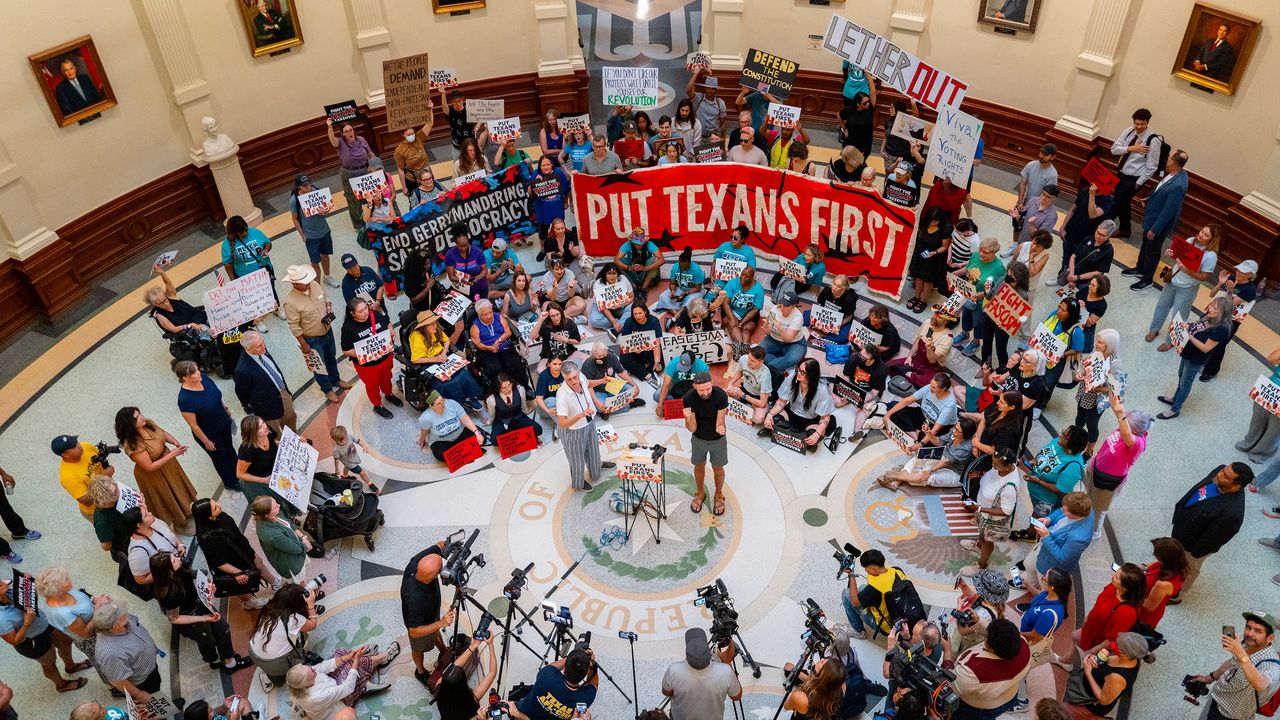In August, as Alvarado was preparing for her filibuster, Lieutenant Governor Dan Patrick called for a three-hour dinner break. Alvarado immediately sensed that something was up. “We all kind of thought, Well, that’s odd. What’s this really for? Because it’s certainly not to eat,” she said. When the legislators returned, instead of calling on Alvarado, Patrick recognized Charles Perry, a Republican from Lubbock, who laid out a dubious objection to Alvarado’s filibuster—she had sent out a fund-raising e-mail that afternoon. “It’s disrespectful, it violates the decorum of the Senate, and personally, I’m offended by it,” he said, and then motioned for an immediate vote on the redistricting bill. It passed along party lines; there would be no filibuster that night. The scattered spectators in the gallery seemed shocked by the speed at which the planned protest had been circumvented. “Fascists! Fascism has come to Texas!” a man yelled. State troopers massed around him; later, he was led out of the capitol in handcuffs.
Aaron Madison, an Austin-based Uber driver, opted to spend his Friday night at the capitol, because he “wanted to see Democrats do something” about the redistricting, he said. “I knew it probably wouldn’t be stopped, but at least to see them fight and delay it. And I was proud that they were going to filibuster.” He’d found the stillborn protest “depressing,” he told me afterward. “I’ve done a lot of volunteering, I’ve worked elections for five years, I’ve volunteered with Beto’s group,” he said, referring to the former Democratic congressman and Presidential candidate Beto O’Rourke. “It’s, like, you want to do something to make a difference, but it feels like, no matter what you do, Republicans find a way to get their way.”
The state legislature is “the finest free entertainment in Texas,” the political columnist Molly Ivins wrote, in 1975. “It beats the zoo any day of the week.” Ivins gleefully chronicled legislators’ fistfights, shoving matches, name-calling, and double-crossing. But she also detected a spirit of mutual allegiance. “There is a Texas legislative tradition that allows them to respect publicly, and yes, even love, those canny country bastards who always beat them,” she wrote.
Little of that collegiality is in evidence these days. Texas Republicans, having gone nearly as far as possible to expand gun access and to ban abortion, have now turned to directly punishing Democrats. Earlier this year, the Texas House prohibited members of the body’s minority party from being able to chair committees, ending a long-standing tradition. In the state Senate, the atmosphere has become “much more divisive, meaner,” Alvarado said. “I think it’s all driven from national politics.” For more than half a century, Texas Monthly has published an annual list of the best and worst legislators; this year, the editors declared that, in a political context dominated by “small-mindedness and an emphasis on punishment and coercion,” they were unable to do so.
Texas Democrats have little structural power—they’re “outnumbered and outgunned,” as Alvarado put it—and their counterparts across the aisle are loath to work with them, so they’ve increasingly focussed on fighting in a different arena. “You have to resort to things you would not ordinarily be doing,” Alvarado said, of her quorum-breaking colleagues. “If they had stayed put and had a spicy, juicy, lively debate, it would not have gotten national attention.” During the lawmakers’ two weeks on the run, Gavin Newsom announced that California would embark on a partisan redistricting map of its own (albeit one that must first be approved by voters). The drama was further heightened by Texas Republican leaders’ calls to track down, fire, or arrest the quorum-breakers. Once the Democratic legislators returned to Texas, they were tailed by state troopers, to insure that they didn’t leave again. Representative Nicole Collier, of Dallas, refused the police escort and instead spent two nights sleeping in her office, live-streaming to an audience that, at times, rivalled that of Davis’s 2013 filibuster. The Democrats may have lost the vote, but they had gained ground in the war for attention.
Making headlines is not always a net positive, given Texas Republicans’ appetite for revenge; national attention is often met with an equally intense backlash. Davis’s stand for abortion rights galvanized women across the state, but Texas went on to pass even more restrictive bills and, eventually, to outlaw abortion even in cases of rape and incest. Davis ran for governor, in 2014, and lost to Greg Abbott by more than twenty points. After the quorum-breaking Democrats returned to the state earlier this month, their G.O.P. colleagues vowed retribution. “They will be lucky if they get out of this special session without it being a whole lot worse than it would have been had they just stuck around,” Tom Oliverson, the chair of the House Republican Caucus said. “If they had any leverage at the start of the last special session, it’s all gone.” After quickly approving the redistricting map, the House has gone on to pass divisive bills that hadn’t succeeded during the regular session, including ones that place further restrictions on abortion pills, and others that require people to use the bathroom that corresponds with their natal sex in government buildings.

